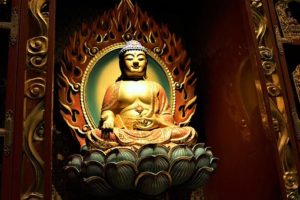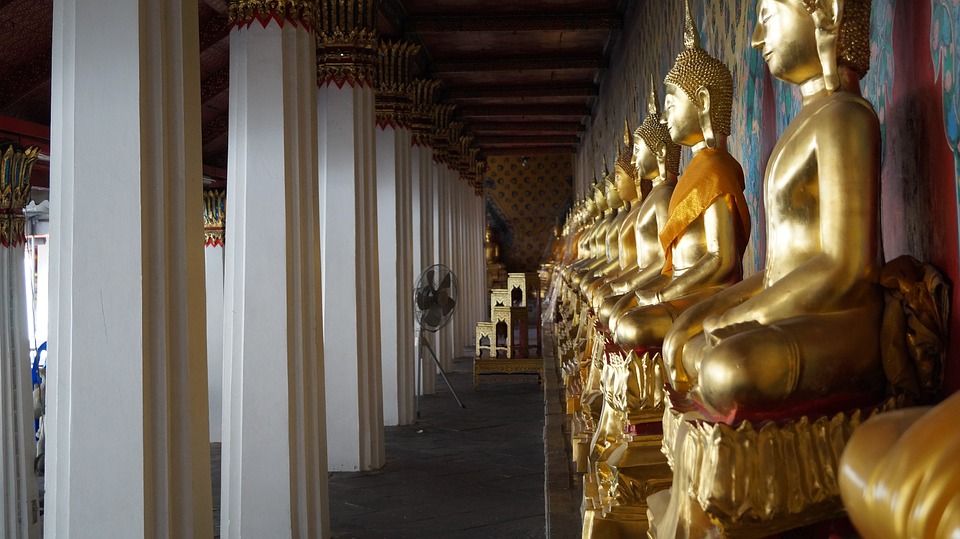Comparing the sayings and teachings of Siddhartha Guatama, the historical Buddha, and the historical Jesus; one would have to be blind not to see some similarities. After all, they were both men who wanted better lives for the people of their respective times and places. Both should be remembered as great figures who put aside the lives of their own in order to teach others how to improve their lives and the world around them. It is only logical then that some of their words would seem to express the same ideas.
But, Mr. Thisayakorn’s assertion that Siddhartha knew of the coming of Jesus and foretold that Siddhartha’s own doctrines should be set aside when he did has serious flaws. In fact, they seem more directed toward the conversion of Asian Buddhists by co-opting the words of Siddhartha. Mr. Thisayakorn is entitled to his beliefs, as I am entitled to refute his article. I have shown Mr. Thisayakorn’s words in quotes followed by my rebuttal to his assertions.
“In his final written word named Ramaka Buddhist Doctrines (Namada sutra in Korean), he said: “When Jesus comes, my Tao (way) will be like a lamp without oil.”
” . . . here are the books of Chunsoo the Keumkang the Prajna-para-mita, the Avatamska Tripitaka and Ramaka Buddhist Doctrines (Namada). In the Namada which is known as the last teaching of lord Buddha, he prophesized the coming of Jesus in about 500 years later. Namada teaching (38:8) recorded that his doctrines would all be useless when Jesus comes. The verse that is known as the last verse in all the books of Shkyamuni is stated, “When Jesus comes, and my Tao (way) will be like a lamp without oil.
Teachings of Siddhartha Passed Down
It is known that Siddhartha never wrote anything down. For centuries after his death, the teachings of Siddhartha were transmitted orally. It wasn’t until the 1st century B.C., in the Pali Canon that his words were first written down. In serious research into early Buddhism it is the Nikayas that are considered the least corrupted texts of Siddhartha’s important teachings. That is where one can come closest to the actual words spoken.
 Nowhere in the written texts of Siddhartha’s final words is any mention of Jesus made. Like the men who wrote the Bible, the true words of Siddhartha were later mistranslated or purposely twisted to fit the agenda of specific groups of people.
Nowhere in the written texts of Siddhartha’s final words is any mention of Jesus made. Like the men who wrote the Bible, the true words of Siddhartha were later mistranslated or purposely twisted to fit the agenda of specific groups of people.
“He was very much disturbed as to how could human being be saved after having seen all the human miseries such as sins, hatred, murders, curses and vices, diseases and deaths.” and “. . . he claimed he attained sudden spiritual enlightenment by a certain invisible power from above.”
Belief in a permanent soul
The use of the word “saved” implies that Siddhartha had a belief in a permanent soul. On the contrary, he believed in the impermanence of all things and had no concept of an afterlife. He also never claimed that an “invisible power” helped him attain enlightenment. Siddhartha told his followers that only through rigorous self-honesty and practice could any man do what he had done. Mystical elements to Siddhartha’s life and teachings came to be as Buddhism was melded with other belief systems, i.e. the Tibetan amalgam of Bon and Buddhism.
“But the truth is there is no evidence of any Buddhist teaching in the entire book of the word of God.”
Marcus Borg, in his book “Jesus and Buddha, The Parallel Sayings” points out that some scholars believe that the strong similarity might point to cross-cultural borrowing from Buddha to Jesus. Buddhist teachers may have lived on the Egyptian coast, in Alexandria and some Buddhist teachings may have reached the homelands of the Jews. He says, “Popular speculation speaks of Jesus having traveled to India during “the missing years”, the decades before he emerged on the stage of history”. Popular speculation can be thought of here as “hopeful guesswork”. There is no proof.
It is not surprising that there is no evidence of Buddhist teachings in the “word of God” because to admit that could weaken the resolve of the faithful. It is not surprising that some purveyors of the Christian faith would attempt to insert the “word of God” into the writings of other faiths and teachings in order to deceive.
“When Jesus comes, my Tao (way) will be like a lamp without oil.”
The use of the word “Tao” shows that this is from a Chinese translation that and as such, is not a legitimate reference to the true words spoken by Buddha. Again, the five texts of the Indian texts, the Pali Nikayas are considered by most scholars to be the reference of the first choice when researching Buddhist doctrine.
 This quote could not be from Siddhartha Guatama. It may, in fact, be found in the documents Mr. Thisayakorn uses as references. If so, I would only wonder about the intent and veracity of the translation. It is not in the Pali Canons. As a formal student of Buddhism, I asked my learned teacher, Shi Yong Xiang, and he has never seen such a quote. I also found no such quote in my own research.
This quote could not be from Siddhartha Guatama. It may, in fact, be found in the documents Mr. Thisayakorn uses as references. If so, I would only wonder about the intent and veracity of the translation. It is not in the Pali Canons. As a formal student of Buddhism, I asked my learned teacher, Shi Yong Xiang, and he has never seen such a quote. I also found no such quote in my own research.
Siddhartha taught that no one should automatically believe the word of any holy man, teacher or book. One should authenticate what they are told through study and/or practice.
Buddhism is not a religion, it is a teaching. Buddhism is not a threat to any form of Christianity. Twisting the words of Siddhartha to benefit any belief system is doing an injustice to all who read the resulting words.





